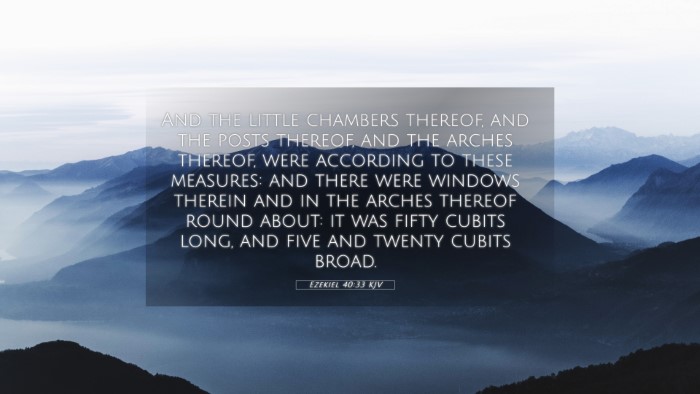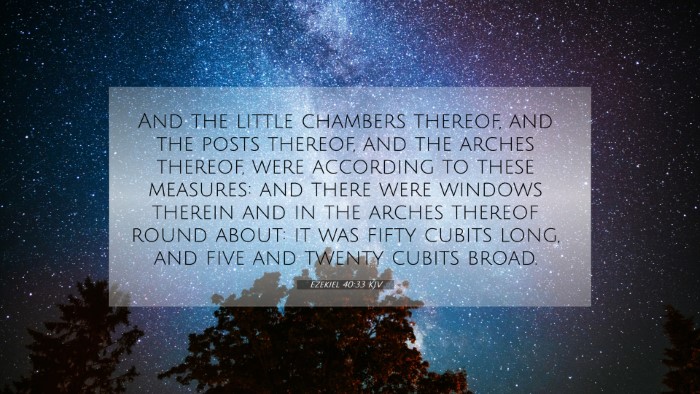Ezekiel 40:33 - Verse Meaning and Interpretation
Ezekiel 40:33 states, "And the little chambers thereof were three on this side and three on that side: they were three stories in them." This verse is part of Ezekiel's vision of a new temple and it highlights the structure and design of this sacred place. Understanding this verse requires not only an examination of its meaning but also its connections with other biblical texts.
Contextual Background
The vision given to Ezekiel is a pivotal moment in the book, representing God's promise of restoration for Israel. The detailed descriptions showcase this renewed temple, emphasizing both its physical characteristics and spiritual significance.
Commentary Insights
-
Matthew Henry's Commentary:
Henry discusses the significance of the temple structure, indicating that the three stories could represent the hierarchy of heaven, earth, and the underworld. Each level has its purpose, reminding believers of God’s order and majesty.
-
Albert Barnes' Notes:
Barnes notes that the size and arrangement of the chambers suggest a theological purpose, intended to accommodate the priests and other worshipers. The organization illustrates the importance of accessibility to God, facilitating proper worship.
-
Adam Clarke's Commentary:
Clarke views the three chambers as indicative of the richness of God’s provision for His people. Each story could symbolize different aspects of our relationship with God and the various ways he interacts with humanity.
Cross-References and Thematic Connections
This verse connects with numerous other biblical passages, providing a multi-dimensional understanding of its message:
- 1 Kings 6:6: Discusses the structure of Solomon's temple, emphasizing the importance of design in worship.
- Hebrews 8:5: Refers to the heavenly sanctuary, drawing parallels between the earthly and heavenly temples.
- Ezekiel 43:10-11: Further elaborates on the vision of the temple, reinforcing God's requirement for holiness in worship.
- Revelation 21:22: Describes the New Jerusalem without a temple, indicating God Himself as the peace and presence.
- Matthew 21:12-13: Jesus cleanses the temple, highlighting the significance and sacredness of worship spaces.
- Isaiah 66:1: Speaks of heaven as God's throne and earth as His footstool, echoing the theme of sacred space.
- Psalms 84:1-2: Expresses the longing for God’s dwelling place, aligning with the feelings evoked in Ezekiel’s vision.
Understanding Through Cross-Referencing
Cross-referencing Bible texts enhances the understanding of Ezekiel 40:33. Readers can utilize tools for Bible cross-referencing to identify connections between scriptures that deepen the analysis and insight into God’s designs for temple worship.
How to Use Cross-Reference Resources
The following strategies can help facilitate effective Bible cross-referencing:
- Bible Concordance: Use a concordance to find words and phrases to locate related verses swiftly.
- Bible Cross-reference Guides: Consult guides that accompany translations to uncover thematic parallels.
- Study Methods: Integrate cross-referencing in personal study times to draw deeper insights into specific themes.
Conclusion
Ezekiel 40:33 serves as a profound reminder of God’s intended order and purpose in the worship of His people. The connections drawn from various other scriptures not only illuminate the meaning of this verse but also encourage believers to explore the depths of their relationship with God through organized worship. As such, engaging with a comprehensive Bible cross-reference system is paramount for deeper understanding and spiritual growth.
Related Bible Verses
In addition to the aforementioned references, here are additional verses that readers may find useful in their study:
- Exodus 25:8: God commands a sanctuary to be built for Him.
- Zechariah 8:20-23: Talks about the return of people to Jerusalem to worship.
- John 4:24: Highlights the importance of worshiping in spirit and truth.
By engaging in comparative Bible verse analysis and utilizing resources designed for cross-referencing Bible texts, believers can enrich their studies and draw meaningful connections throughout the sacred scriptures.





